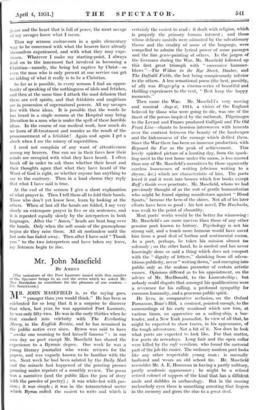Mr. John Masefield
By AMICUS [The caricature of the Poet Laureate issued with this number of the Spectator brings to an end the series which we asked Mr. Max. Beerbohm to contribute for the pleasure of our readers.— Ed. SPECTA1011,.] MR. JOHN MASEFIELD is, as the saying goes, younger than you would think." He has been so celebrated for so long_ that it is a surprise to discover that when, last year, he was appointed Poet Laureate, he was only fifty-two. He was in the early thirties when he first crashed into celebrity with The Everlasting Mercy, in the English Review, and he has remained in the public notice ever since. Byron was said to have " awoke one morning to find himself famous " : in our own day no poet except Mr. Masefield has shared the experience to a Byronic degree. One week he was a young literary journalist who wrote reviews for the papers, and was vaguely known to be familiar with the sea. Next week he had been saluted by the Daily Mail and the miracle had happened of the printing presses groaning under reprints of a monthly review. The poem was a narrative (and the public likes the jam of story with the powder of poetry) ; it was white-hot with pas- sion ; it was simple ; it was in the tetrametrical metre which Byron called the easiest to write and which is certainly the easiest to read ; it dealt with religion, which is properly the primary human interest ; and those whose delicate nostrils were affronted by the salvationary theme and the crudity of some of the language, were compelled to admire the lyrical power of some passages and the fine genre-painting of others. In the jargon of the Germans during the War, Mr. Masefield followed up this first great triumph with " successive hammer- blows "—The Widow in the Bye Street, Dauber, and The Daffodil Fields, the last being conspicuously inferior to the others. A less sensational poem (the best, possibly, of all) was Biography a cinema-series of beautiful and thrilling experiences to the text, " Best keep the happy moments."
Then came the War. Mr. Masefiell's very moving and musical Augt st, 1914, a vision of the England beloved by those who were going to die, was one of the finest of the poems inspired by the outbreak. Pilgrimages to the Levant and France produced Gallipoli and The Old Front Line—chants to heroism interwoven with laments over the contrast between the beauty of the landscapes and the hideousness of the carnage which defiled them. Since the War there has been an immense production, with Reynard the Fox as the peak of achievement. This lovely spirited picture of a hunting day, from the spark- ling meet to the trot home under the moon, is less marred than any of Mr. Masefield's narratives by those apparently careless loosenesses of writing (obvious writing to a rhyme, &c.) which are characteristic of him. The poets loved it and it went into houses which few books except Ruff's Guide ever penetrate. Mr. Masefield, whom we had previously thought of as the sort of gentle humanitarian who might be found signing manifestoes against " Blood 'Sports," became the hero of the shires. Not all of his later efforts have been so good : his last novel, The Hawbucics, was weak to the point of absurdity.
Most poets' works would be the better for winnowing : Mr. Masefield's arc more uneven than those of any other genuine poet known to history. Psychology is not his strong suit, and a touch more humour would have saved him from a good deal of bathos and sentimental excess. As a poet, perhaps, he takes his mission almost too solemnly ; on the other hand, he is modest and has never . knowingly done or said a thing which does not comport with the " dignity of letters," shrinking from all adven- titious publicity, never " writing down," and emerging into public only as the zealous promoter of certain artistic causes. Opinions differed as to his appointment, on the advice of 111r. MacDonald, to the Laureateship ; but nobody could dispute that amongst his qualifications were a. reverence for his calling, a profound sympathy for common humanity, and a generous public spirit.
He lives, in comparative seclusion, on the Oxford Parnassus, Boar's Hill, a contrast, pointed enough, to the surroundings of his early manhood which saw him, at various times, an apprentice on a sailing-ship, a bar- tender, and a New York journalist. In view of all that, he might be expected to show traces, in his appearance, of the tough adventurer. Not a bit of it. Nor does he look what poets are expected to look like. For that matter, few poets do nowadays. Long hair and the open collar were killed by the café versifiers, who found the sartorial part of the job the easier. The ordinary modern poet looks like any other respectable young man : is normally barbered and wears an old. school tie. Mr. Masefield resembles Mr. A. E. Housman in having a partly military, partly academic appearance ; he might be a refined retired colonel of sappers of the kind that has a diffident . smile and dabbles in archaeology. But in the musing melancholy eyes there is something arresting that lingers in the memory and gives the clue to a great deal.








































 Previous page
Previous page